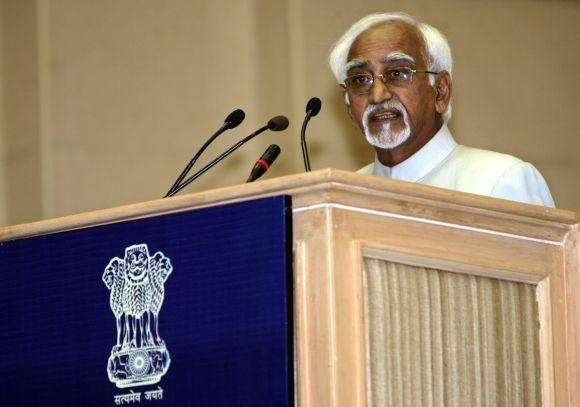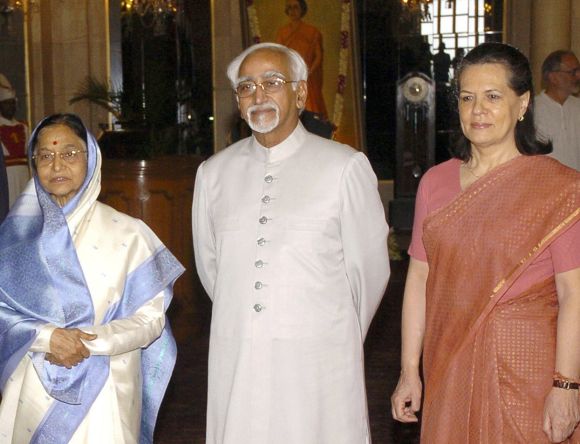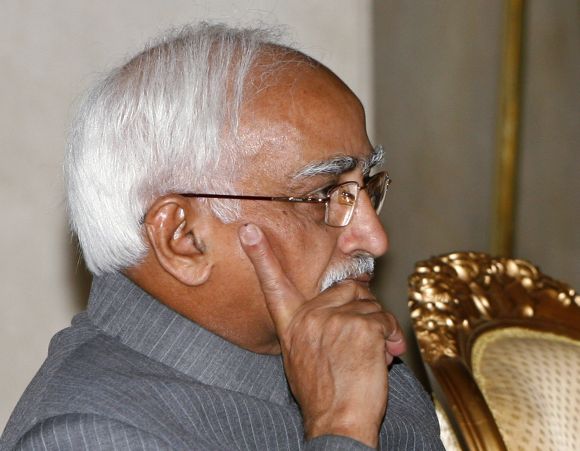
Hamid Ansari, in his second stint as vice president, is likely to face a more unruly House, with general elections being less than two years away and the Opposition becoming increasingly aggressive, and the Congress's chief troubleshooter having gone to Rashtrapati Bhavan, writes Neerja Chowdhury.
The importance of the re-election of Mohammed Hamid Ansari as the country's vice president lies not just in the United Progressive Alliance managing to get its candidate through with a convincing margin, after sending its presidential nominee Pranab Mukherjee to Rashtrapati Bhavan.
Both these victories have undoubtedly come as a morale-booster for an otherwise beleaguered ruling combine, battered over the last two years by scams and crises. There was a time two months ago when the ability of the UPA to get its candidates elected as President and vice president was under serious doubt.
Nor does Ansari's import lie merely in him being able to successfully transit from being viewed as a nominee of the Left parties -- which had supported him for vice presidentship in 2007 and they had their way because of the clout they carried in UPA I -- to being adopted as the candidate of the Congress, and the UPA.
Please ...

It is an open secret that he was Congress chief Sonia Gandhi's first preference for Rashtrapati, and since that post eluded him, the Congress high command had its way in his acceptance as the UPA's vice presidential choice again.
This speaks volumes about Ansari's political savvy, though his diplomatic skills had never been in question. Over the last couple of years, he has moved quite strategically to "win friends and influence people" who mattered.
When he was elected VP in 2007, there was scepticism about how he, a career diplomat and an academic, would manage a turbulent Parliament -- the Rajya Sabha being no less stormy on occasions than the Lok Sabha -- and a body of hardboiled politicians.
Barring that "blot" last December of adjourning the Rajya Sabha, which the Opposition wanted extended to discuss the anti-corruption Lokpal Bill, he is viewed as an erudite, scholarly, and a cultured VP, and non-partisan in the way he ran the House.
It is possible that now that he is elected vice president again, he may take the country into confidence on why he adjourned the Rajya Sabha that December night.
Clearly, and this goes without saying, his importance -- particularly for the Congress -- also lies in his being a Muslim from eastern Uttar Pradesh, though he has never worn his Muslim credentials on his shirt sleeves. It is for this reason that both Samajwadi Party chief Mulayam Singh Yadav and Bahujan Samaj Party supremo Mayawati found it difficult to oppose his candidature. Bihar Chief Minister Nitish Kumar is believed to have indicated that but for the fact he was in a comfortable enough position, he might have backed him!

Hamid Ansari may not have been a mass leader, but the positions he held have given him a weighty profile and endowed him with a gravitas needed for the job ahead of him -- having been vice chancellor of Aligarh Muslim University (2000-02), chairman of the National Minorities Commission (2006-07), and India's ambassador to important countries like the United Arab Emirates, Afghanistan, Saudi Arabia and Iran, besides being the high commissioner to Australia.
Symbolism still matters in Indian politics, and there are hardly any tall "poorvaia leaders" left from the eastern part of UP, more known now as the "badlands" of the state -- Ansari comes from Ghazipur, though born in Kolkata -- which may determine political fortunes in 2014.
As VP, giving the hundreds of speeches that the vice pesident is required to deliver, he has flagged off interesting ideas, like bringing intelligence agencies under Parliament's purview, or extending the Comptroller and Auditor General audit to non-governmental organisations and societies and those 'public authorities' which are covered by the Right To Information Act. He tried to shift around the timing of the Question Hour, which did not work.
No doubt, in his second stint as vice president Ansari is likely to face a more unruly House, with general elections being less than two years away and the Opposition becoming increasingly aggressive, and the Congress's chief troubleshooter having gone to Rashtrapati Bhavan. But a second term is also bound to lend more weight to his efforts, and give him more elbow room and he may be able to provide a more effective steer in Parliament as also in the parliamentary committees behind the scenes.
The real importance of being Hamid Ansari today, however, lies in the fact that when the political system is in some way becoming more constrictive, increasingly favouring the entry of more and more members of political families, he as a so-called outsider is making it to a top position. He has managed to buck that trend and to that extent his re-election goes to strengthen our democratic set-up.
...